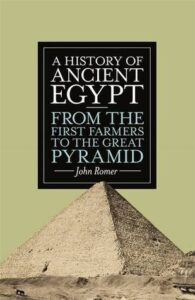 A History of Ancient Egypt: From the First Farmers to the Great Pyramid, John Romer
A History of Ancient Egypt: From the First Farmers to the Great Pyramid, John Romer
I don’t know much about modern Egyptology; it’s been a long time since I read exhaustively about the subject, and the books I referred to then were either for children or very out of date, albeit fascinating in their own way. (Christine Desroches-Noblecourt’s description of the treasures and items found in King Tutakhamen’s tomb held me spellbound for days at a time, and I frequently returned to it, fascinated by what we could glean of the boy king, and of Ankhasamen, his sister-bride.) This book kept some of the fascination of those books for me, though it deals with early Egypt, the very first pharaohs. That does mean it covers up to the construction of Khufu’s Great Pyramid, so it does include some of the very classic Egyptian things people think of, though not the gold-encrusted tombs of later pharaohs.
Because I don’t know much about modern archaeology in Egypt, I can’t really speak to the accuracy of Romer’s interpretations. There is an extensive bibliography, of course, and he steers away from some of the romanticised, imperialist assumptions of earlier theories. Still, at times I had no idea how solid a base his theories stood on: he seemed to spend a lot of time telling the reader what can’t be gleaned from the remains, and then building up some kind of story — a court organised around early pharaohs, controlling the flow of goods along the Nile — anyway.
On a purely stylistic level, it has some of the grandeur and wonder of the books I used to read, and finds wonder in the simplest carvings and burials as well as the feats of engineering, but the sentence structure… needs work. I don’t usually nitpick grammar, but there were far too many long sentences where the subject wasn’t clear, or which lost focus halfway through, or were fragments. Quite offputting.
I’m definitely interested in reading the follow-up volume, once it’s out!
Rating: 4/5

Leave a Reply